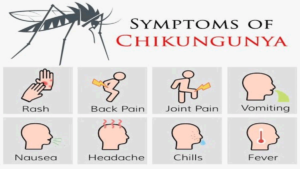Chikungunya – Questions and Answers

What is Chikungunya?
Chikungunya is a viral disease that is transmitted to people via mosquitoes and has been identified in nearly 40 countries around the world including Africa, Asia, some parts of Europe and The Amercias. Chikungunya was then identified in late 2013 as having spread to some parts of the Caribbean.
What insects transmit the disease?
Aedes species mosquitoes transmit Chikungunya virus, these being the same species that transmit the dengue virus, and they bite mostly during daytime.
What are the symptoms of Chikungunya?
Symptoms usually begin within 3 – 7 days after being bitten and can include:
– Common Symptoms include fever and severe joint pain, usually in the feet and hands.
– Other symptoms include headaches, muscle pain, joint swelling or a rash.

How do I get tested?
Seek medical attention if you think you or a family member might have Chikungunya, your doctor may order blood tests to determine if you have Chikungunya or any other similar diseases.
What treatment can I expect?
There are medicines to help reduce the fever and pain brought on by Chikungunya however to date there are no antiviral medicines to treat the disease.
How long will I be ill for and what is the long term implications?
Most patients feel better within a week however some may suffer from longer-term joint pain. People at increased risk for severe disease include newborns exposed during delivery, older adults (65+ years), and people with medical conditions such as high blood pressure, diabetes or heart disease. It is worth noting that death from Chikungunya is rare.
So what methods of prevention are there?
There is no vaccine or medication to prevent Chikungunya virus, infection or disease however you will be able to reduce your exposure to mosquitoes. The best forms of protection from mosquitoes are:
– Use air conditioning or window/door screens.
– Use mosquito nets that have been treated with repellents.
– Use mosquito repellents on exposed skin especially any that include DEET, Picaridin, Oil of Lemon Eucalyptus or IR3535.
– Wear insect repellent clothing or treat clothing with permethrin based sprays.
– Empty standing water from outdoor containers.
People at increased risk for severe disease should consider not travelling to areas with ongoing Chikungunya outbreaks. Once you are sick with Chikungunya you should avoid mosquito bites to prevent further spread of the disease.
Further Information
Most of the information above was obtained from the World Health Organisation Fact Sheet.

